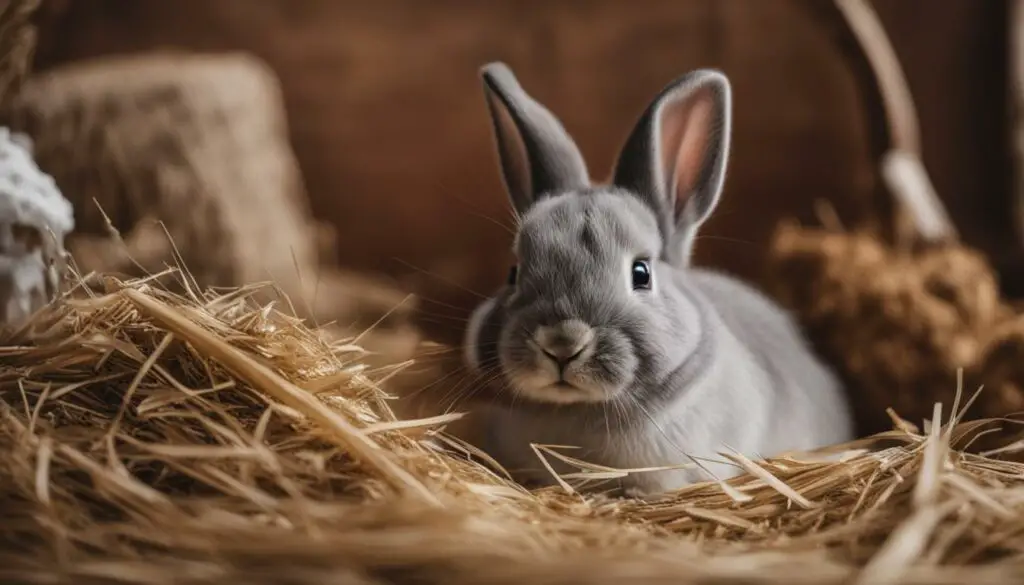Congratulations on becoming a new paw parent to an adorable baby rabbit! Caring for a baby rabbit is different from an adult bunny, and it’s important to be prepared with the right information. In this essential care guide, I will cover everything from preparing for your new baby rabbit to feeding, grooming, and keeping them in good health.
Key Takeaways
- Provide a safe and spacious enclosure for your baby rabbit
- Offer a diet of hay, pellets, and fresh foods for their nutritional needs
- Groom your baby rabbit regularly to prevent fur blockages
- Interact and play with your baby rabbit to build a bond
- Monitor their health and behavior closely and consult a vet if needed
Preparing For Your New Baby Rabbit
When bringing home a new baby rabbit, it’s important to create a suitable environment that meets their needs. By preparing in advance, you can ensure your furry friend feels safe and comfortable from the moment they arrive. Here are some key considerations for setting up your baby rabbit’s enclosure:
Choosing the Right Enclosure
A safe and spacious enclosure is essential for your baby rabbit’s well-being. Consider using a large dog crate or connect storage panels to create a suitable space. The minimum size for a rabbit enclosure should be 30” by 36”, but providing a larger area will allow your rabbit to explore and play more freely. Ensure the enclosure has a solid bottom to prevent any escape attempts.
Setting Up the Essentials
- Litter Box: Place a litter box with enough bedding in one corner of the enclosure. This will help teach your baby rabbit to use a specific area for bathroom needs.
- Hideout: Provide a cozy hideout, such as a small box or hideaway tunnel, where your rabbit can retreat and feel secure.
- Water Bowl: Make sure to provide a water bowl that is easily accessible for your baby rabbit to stay hydrated.
- Natural Toys: Include a variety of safe, chewable toys made from natural materials, such as untreated wood or woven grass, to keep your rabbit entertained and stimulated.
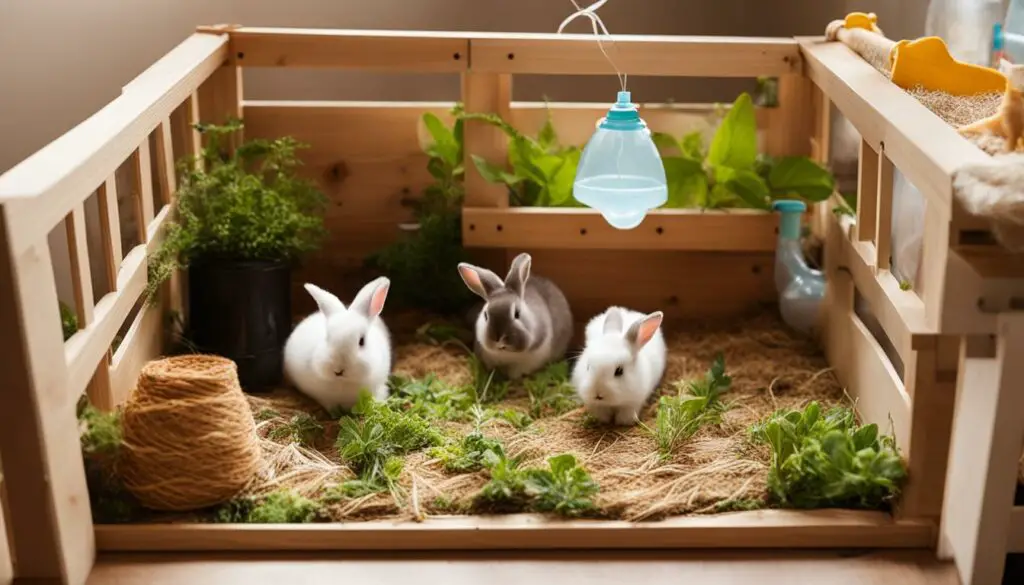
Remember to regularly inspect and clean the enclosure to maintain a healthy environment for your baby rabbit. By preparing the right space, you can ensure your little friend has a great start to their new home.
What To Feed Your Baby Rabbit
Feeding your baby rabbit a balanced and nutritious diet is essential for their growth and development. Here is a breakdown of the key components of their diet:
- Hay: Hay should be the foundation of your baby rabbit’s diet. It provides essential fiber and helps maintain healthy digestion. Offer unlimited access to fresh hay, such as timothy or orchard grass.
- Pellets: Choose high-quality pellets specially formulated for young rabbits. Look for pellets that are free from fillers and contain essential nutrients. Offer a small amount of pellets daily, approximately 1/8 to 1/4 cup.
- Treats: Treats can be given in moderation to bond with your rabbit. Look for specifically formulated rabbit treats that are low in sugar. Avoid giving sugary fruits to baby rabbits, as their digestive systems are still developing.
- Fresh Foods: Once your baby rabbit is at least 3 months old, you can gradually introduce fresh foods into their diet. Start with small portions of leafy greens, such as kale, parsley, and romaine lettuce. Offer a variety of vegetables to provide different nutrients.
It’s important to note that a baby rabbit’s diet will change as they grow. Consult with a veterinarian who specializes in exotic animals to ensure you are providing the best nutrition for your baby rabbit.
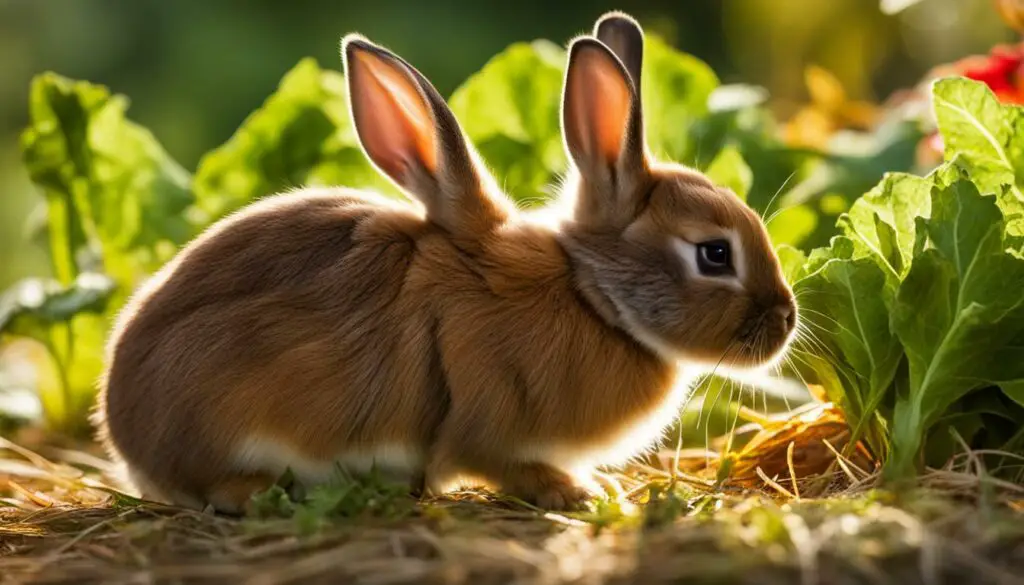
Important Points to Remember:
- Hay should be available 24/7 to support healthy digestion.
- Pellets should be high-quality and offered in moderation.
- Choose rabbit-specific treats that are low in sugar.
- Introduce fresh foods gradually when your baby rabbit is at least 3 months old.
- Consult with a veterinarian for personalized dietary recommendations.
Remember, providing a balanced diet is crucial for your baby rabbit’s overall health and well-being. By following these guidelines, you can ensure that your furry friend is getting the nutrition they need to thrive.
Grooming Your Baby Rabbit
Grooming is an important aspect of caring for your baby rabbit, as it helps maintain their overall health and well-being. Regular grooming sessions not only keep their fur clean and free from matting, but also allow you to bond with your bunny. Here are some essential grooming practices to keep your baby rabbit looking and feeling their best:
Brushing:
Regular brushing is essential to remove loose fur and prevent blockages in your baby rabbit’s digestive system. Use a soft-bristled brush or a grooming glove to gently brush their fur in the direction of growth. Pay special attention to the areas behind their ears, under their chin, and around their tail, as these can be prone to matting.
Nail Clipping:
Clipping your baby rabbit’s nails is necessary to prevent them from becoming overgrown or curling, which can cause discomfort and difficulty in movement. Use a pair of small pet nail clippers and be careful not to cut the quick, which is the pink part inside the nail that contains blood vessels. If you’re unsure or uncomfortable doing it yourself, it’s best to seek assistance from a veterinarian or a professional groomer.
Exotic Vet Care:
It’s important to have an exotic veterinarian familiar with rabbits on hand for any grooming concerns or health issues. They can provide guidance on proper grooming techniques, address any concerns you may have, and ensure your baby rabbit is in good health. Regular veterinary check-ups are also recommended to catch any potential health issues early and provide appropriate care.
Table: Grooming Supplies
| Supplies | Usage |
|---|---|
| Soft-bristled brush or grooming glove | To remove loose fur and prevent matting |
| Pet nail clippers | To clip your baby rabbit’s nails |
| Styptic powder | To stop bleeding if a nail is accidentally cut too short |
Remember to make grooming sessions a positive experience for your baby rabbit by offering treats and praise. Take your time and be gentle, allowing them to get used to the sensation of being groomed. With regular grooming and care, your baby rabbit will not only look adorable but also thrive in their new home.
Interacting With Your Baby Rabbit
Interacting with your baby rabbit is a wonderful way to bond and build a strong relationship. Remember to be patient and allow your bunny to approach you at their own pace. Here are some tips for engaging with your baby rabbit:
- Start with gentle interactions: Allow your baby rabbit to explore their surroundings and approach you when they’re ready. Avoid sudden movements or loud noises that may startle them.
- Provide toys for playtime: Baby rabbits are naturally curious and love to play. Offer a variety of safe toys, such as chew toys or puzzle toys, to keep them entertained and stimulate their minds.
- Supervised exercise outside of the cage: Daily exercise outside of the cage is essential for your baby rabbit’s physical and mental well-being. Ensure the area is safe and secure, and always supervise their playtime to prevent accidents.
“Play is an important part of a baby rabbit’s development. It helps them build confidence, sharpen their coordination skills, and provides mental stimulation. Be sure to spend quality time with your bunny every day to foster a strong bond.”
Remember, each baby rabbit is unique, so take the time to get to know their preferences and personality. Some rabbits may enjoy being cuddled and held, while others may prefer to explore and play independently. Always respect your baby rabbit’s boundaries and provide a safe and enriching environment for them to thrive.
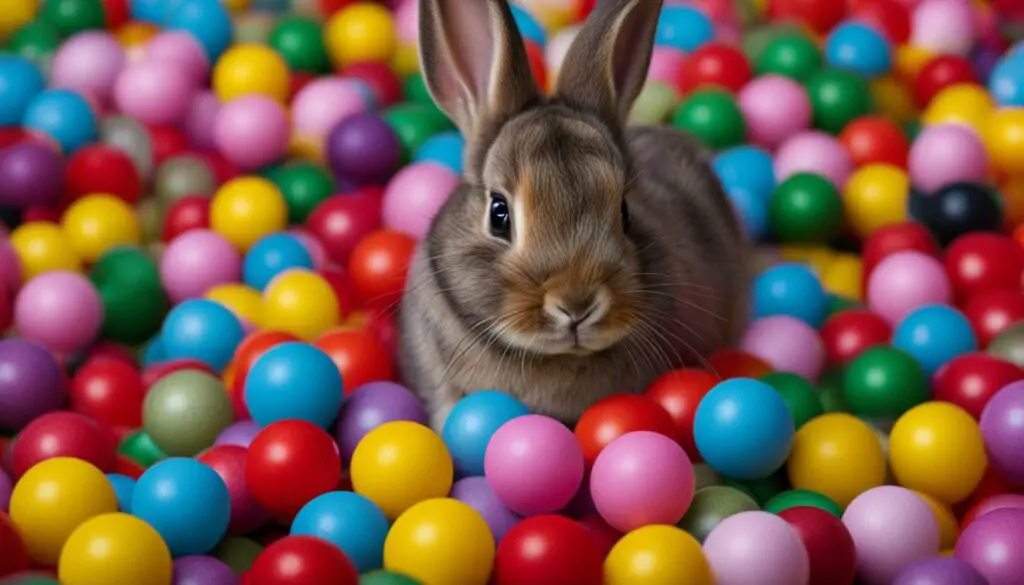
Keeping Your Baby Rabbit In Good Health
Ensuring the good health of your baby rabbit is of utmost importance. One vital aspect of their well-being is spaying or neutering. Spaying is the surgical removal of the female rabbit’s reproductive organs, while neutering is the removal of the male rabbit’s testes. These procedures help prevent hormonal behaviors, reduce the risk of certain cancers, and control the rabbit population. It is advisable to consult a veterinarian who specializes in exotic animals for the surgery.
Regular visits to a rabbit-savvy veterinarian are crucial to monitor your baby rabbit’s health. These professionals will provide vaccinations, conduct routine check-ups, and address any concerns you may have. Remember, rabbits are prey animals and often hide their illnesses, so it’s important to be vigilant for any signs of distress or abnormal behavior. Common symptoms of rabbit health issues include diarrhea, low appetite, limping, sneezing, and lethargy.
Alongside spaying/neutering and veterinary care, maintaining a proper diet and exercise routine is essential for your baby rabbit’s well-being. Offer a balanced diet that includes a variety of fresh vegetables, high-quality pellets, and unlimited access to hay. Implement a playtime routine to ensure they get adequate exercise outside their enclosure. By taking these measures and being attentive to any changes in your rabbit’s behavior or health, you can help keep your furry friend in optimal health.
Regular visits to a rabbit-savvy veterinarian are crucial to monitor your baby rabbit’s health.
| Spaying/Neutering | Veterinary Care | Diet and Exercise |
|---|---|---|
| Prevents hormonal behaviors | Regular check-ups and vaccinations | Offer a balanced diet and unlimited hay |
| Reduces the risk of certain cancers | Address any health concerns | Implement a playtime routine |
| Controls the rabbit population | Monitor for symptoms of illness |
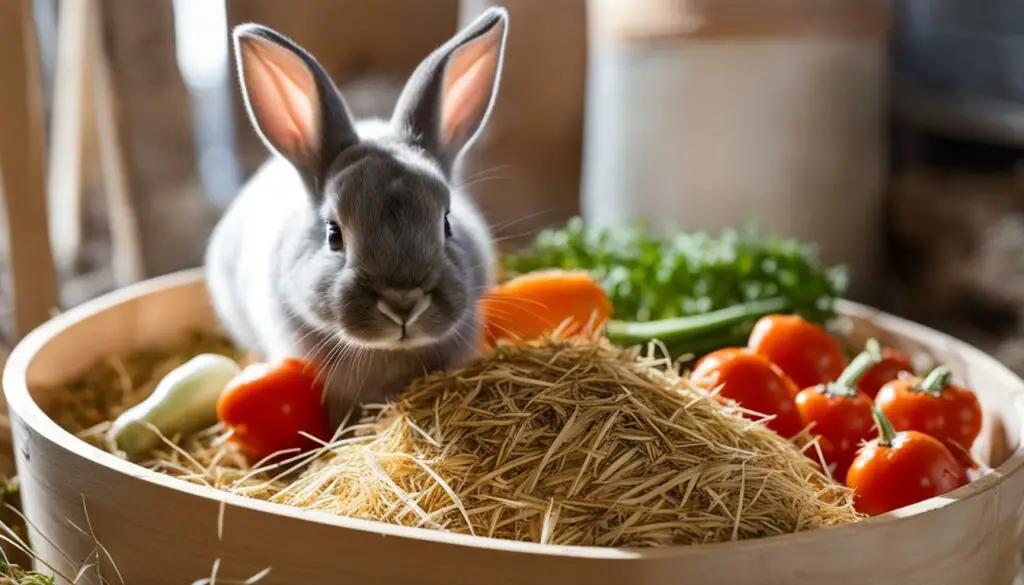
Resources for Baby Rabbit Health:
- Rabbit Health in the 21st Century: Comprehensive guidebook for rabbit owners, covering topics such as diet, health care, and common illnesses.
- Rabbit Welfare Association and Fund: An organization that provides resources and information on rabbit health and welfare.
- House Rabbit Society: Offers guidance on rabbit care, including health tips, diet recommendations, and finding a rabbit-savvy veterinarian.
Caring for Newborn Baby Rabbits
When it comes to caring for newborn baby rabbits, there are some important considerations to keep in mind, whether you come across wild baby rabbits or have domestic baby rabbits in need of care. In the case of wild baby rabbits, it’s best to leave them alone unless they are in immediate danger. The mother rabbit will nurse them for a few minutes a day and will return to care for her babies. However, if you have domestic baby rabbits that require care, there are steps you can take to ensure their well-being.
For domestic baby rabbits, it’s important to provide them with a soft nest area in a box lined with clean towels. This will create a warm and comfortable space for them to rest and grow. Hand-feeding with a specially formulated formula can be done if the mother is unable to care for them properly. It’s essential to follow the instructions of a veterinarian or an experienced rabbit caretaker when it comes to hand-feeding, as it requires precision and knowledge of the specific needs of baby rabbits.
Remember, caring for newborn baby rabbits requires patience, attention to detail, and a thorough understanding of their unique needs. Be sure to consult with professionals and experts in rabbit care to ensure the best possible care for these delicate creatures.
| Caring for Newborn Baby Rabbits | Wild Baby Rabbits | Domestic Baby Rabbits |
|---|---|---|
| Leave them alone unless in danger | Provide a soft nest area | Follow veterinary guidance |
| Mother will nurse them briefly | Use clean towels for bedding | Hand-feed with a formula if necessary |
It’s important to remember that each situation is unique, and seeking professional advice is crucial when caring for newborn baby rabbits.
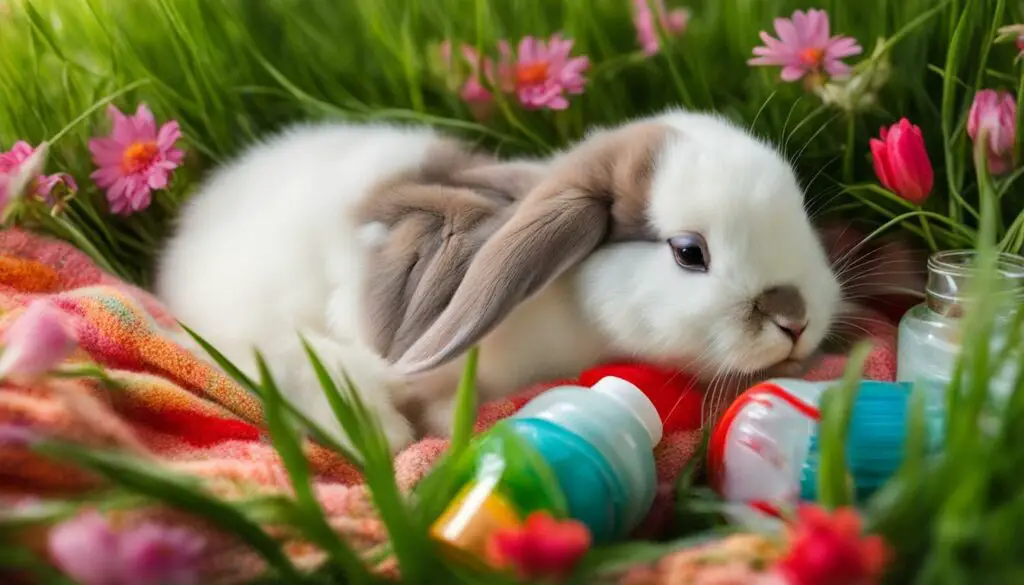
Baby Rabbit Milk: A Vital Source of Nutrition for Growing Bunnies
When it comes to the development and growth of baby rabbits, their mother’s milk plays a crucial role. Rabbit milk is rich in essential nutrients, including fat and protein, which are vital for their rapid growth and overall health. The composition of rabbit milk is specifically designed to meet the nutritional needs of baby bunnies during their early stages of life.
The milk produced by mother rabbits contains high levels of fat, which provides the energy necessary for the baby rabbits’ growth. Additionally, rabbit milk is also abundant in protein, which is vital for building and repairing tissues. These nutrients are essential for ensuring that the baby rabbits develop strong bones, muscles, and a healthy immune system.
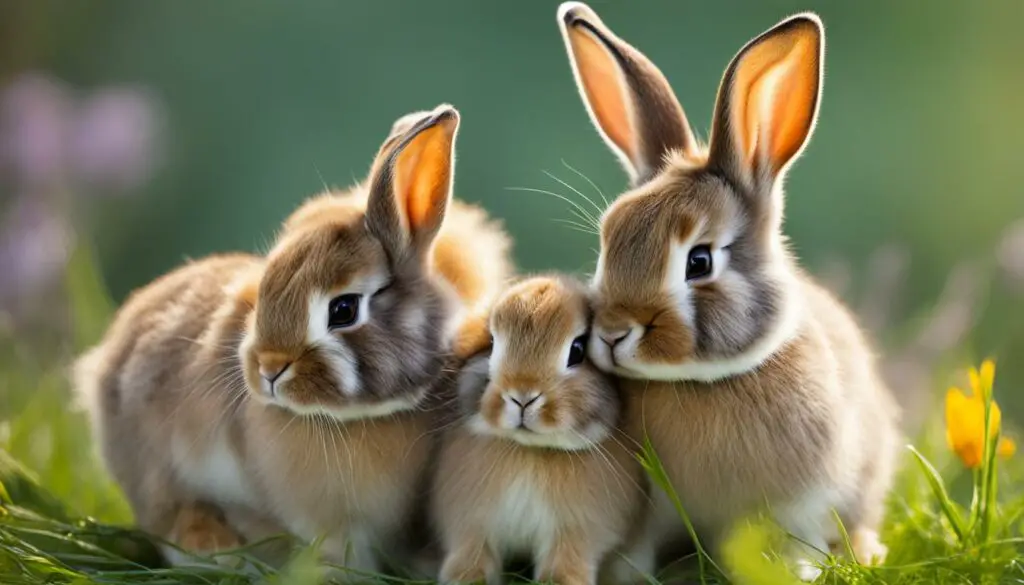
It is important to note that the composition of rabbit milk can vary depending on factors such as the litter size and birth weight of the baby rabbits, as well as the temperature in their environment. These factors can influence the growth rate and development of the baby rabbits.
In conclusion, rabbit milk serves as a vital source of nutrition for growing baby rabbits. Its composition, high in fat and protein, provides the essential nutrients necessary for their rapid growth and development. Understanding the importance of rabbit milk can help ensure that baby rabbits receive the proper care and nutrition they need to thrive.
Immature Mothers
When it comes to caring for baby rabbits, sometimes you may encounter an immature mother who may not build a nest or produce milk promptly. This can leave the baby rabbits without the care they need to survive and thrive. In such cases, it’s important to intervene and provide the necessary nourishment and care until the mother is able to take over.
One of the key indicators of an immature mother is her inability to build a proper nest for her babies. This can be a result of her young age or lack of experience. Without a nest, the baby rabbits are left exposed and vulnerable. To ensure their well-being, you can create a soft nest area in a box with clean towels to provide warmth and comfort.
Additionally, hand-feeding the baby rabbits becomes essential in the absence of their mother’s milk. It’s important to weigh the babies daily to ensure they are gaining weight and receiving the appropriate amount of nutrition. This can be done by preparing a suitable formula with ingredients like goat’s milk, kitten milk replacer, colostrum, and heavy cream. Providing this formula at regular intervals will help meet their nutritional needs until the mother is ready to take over.
| Key Points | Action Steps |
|---|---|
| Identify an immature mother | Observe her behavior, nesting habits, and milk production |
| Create a safe nest area | Use a box with clean towels to provide warmth and comfort |
| Hand-feed the baby rabbits | Prepare a suitable formula and feed them at regular intervals |
Remember, it’s crucial to monitor the baby rabbits closely and consult with a veterinarian for guidance and support. They can provide further advice on proper care techniques and ensure the babies are progressing well. With your intervention and care, immature mothers can still raise healthy and happy baby rabbits.
Overall, dealing with immature mothers requires extra attention and effort to ensure the well-being of the baby rabbits. Monitoring their growth, providing a safe environment, and hand-feeding when necessary are crucial steps in helping them thrive. With patience and care, these baby rabbits have a chance at a healthy and happy life.
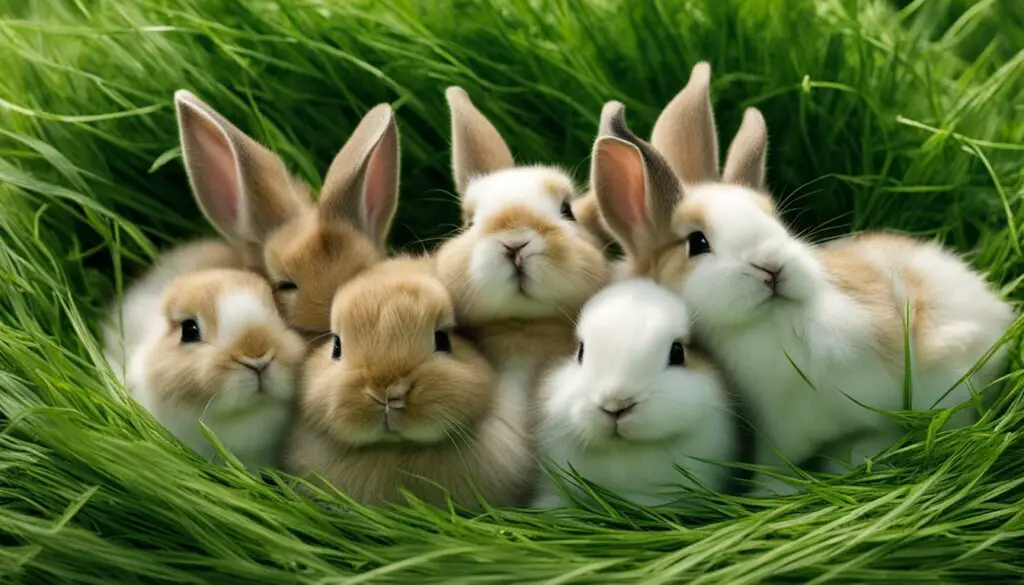
The Role of the Father
When it comes to baby rabbits, the role of the father is crucial in ensuring the well-being of the family. In most cases, the father rabbit will remain tolerant of the baby rabbits, providing them with guidance and protection. However, it’s important to be aware of the potential changes in behavior as the babies reach puberty. At this stage, the father may become aggressive towards the young rabbits, posing a threat to their safety. To prevent any harm, it’s recommended to separate the father from the babies once they reach sexual maturity.
Separating the father rabbit is not only crucial for the safety of the babies but also to avoid any unwanted pregnancies. Neutering the father is highly advisable as it helps to eliminate hormonal behaviors and reduce the risk of breeding. By neutering the father rabbit, you can ensure a harmonious and peaceful environment for both the father and the babies.
When it comes to the well-being of the baby rabbits, it’s important to prioritize their safety and provide them with a nurturing environment. Separating the father rabbit at the appropriate time is one of the key steps in ensuring their welfare. Remember, a responsible rabbit parent takes into account the needs of both the father and the babies, providing them with the best possible care.
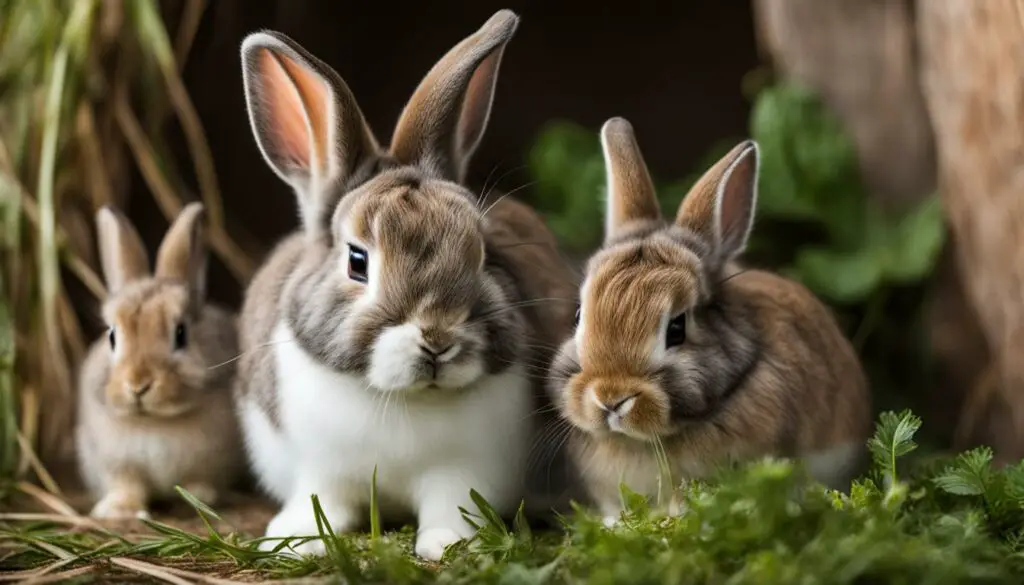
The Importance of Neutering
Neutering the father rabbit is a crucial step in preventing unwanted pregnancies and maintaining a harmonious family dynamic. By neutering the father, you eliminate the risk of aggressive behavior towards the babies and ensure a safe environment for their growth and development.
“Separating the father rabbit at the appropriate time is one of the key steps in ensuring the well-being of the baby rabbits.”
Creating a Peaceful Environment
Separating the father rabbit from the babies once they reach sexual maturity helps create a peaceful and stress-free environment. This allows the babies to thrive and grow without the risk of harm from aggressive behavior. Neutering the father further enhances the overall well-being of the family, promoting a harmonious and enjoyable rabbit parenting experience.
| Benefits of Separating the Father Rabbit | Benefits of Neutering |
|---|---|
| Prevents aggressive behavior towards the babies | Reduces the risk of unwanted pregnancies |
| Ensures a safe environment for the babies | Eliminates hormonal behaviors in the father |
| Promotes a harmonious family dynamic | Improves the overall well-being of the family |
What if the Mother Isn’t Feeding Her Babies?
If you notice that the mother rabbit isn’t feeding her babies, it’s important to step in and provide the necessary care. Hand-feeding baby rabbits is a delicate process, but with the right knowledge and patience, you can ensure their nutritional needs are met.
Hand-feeding baby rabbits should always be done under the guidance of a veterinarian, as they can provide specific instructions and monitor the progress of the babies closely.
The first step is to create a formula that mimics the nutritional composition of the mother’s milk. A suitable formula can be made using goat’s milk, kitten milk replacer, colostrum, and heavy cream. It’s important to follow the recommended ratios and ensure the formula is warm but not hot before offering it to the baby rabbits.
When hand-feeding, use a syringe or a small animal nursing bottle with a soft nipple. Be gentle and patient, allowing the babies to suckle at their own pace. It’s crucial to feed them small amounts frequently, as their tiny stomachs cannot handle large volumes of milk at once. As the babies grow, their feeding schedule and formula composition may need to be adjusted, so regular communication with the vet is essential.
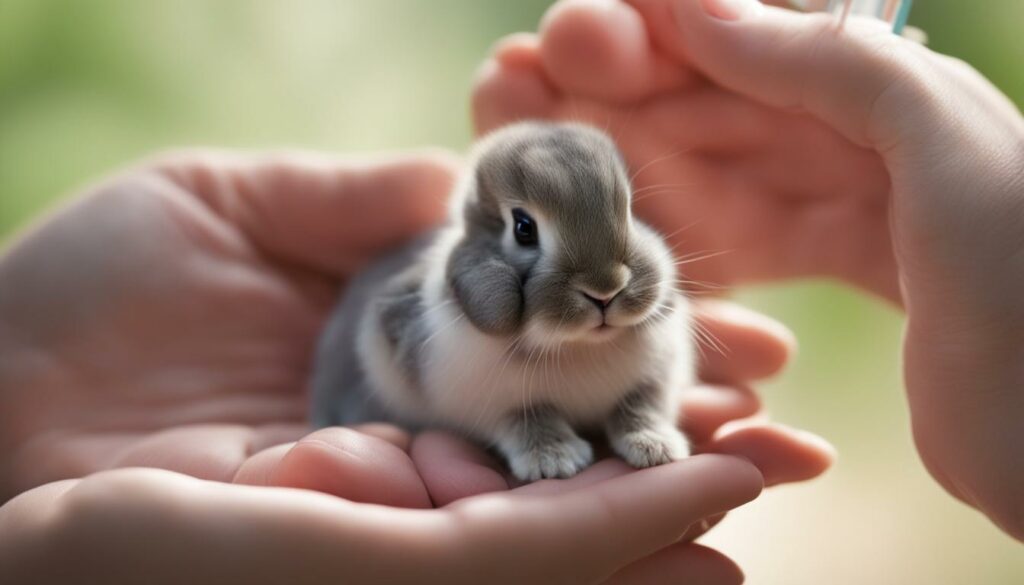
Symptoms to Watch for
While hand-feeding, it’s important to monitor the baby rabbits for any signs of distress or health issues. Some common symptoms to watch for include:
- Weakness or lethargy
- Poor weight gain
- Dehydration
- Diarrhea or abnormal stool
- Abnormal bloating
- Difficulty breathing
If you notice any of these symptoms, it’s important to consult with a veterinarian immediately, as it could indicate an underlying health problem that requires prompt attention.
Conclusion
When a mother rabbit is unable to feed her babies, hand-feeding becomes crucial for their survival. With the right formula, feeding equipment, and veterinary guidance, you can provide the necessary care and nutrition to help the baby rabbits thrive. Remember to monitor their progress closely and seek professional help if any concerns arise.
Baby Rabbit Parenting
As a new baby rabbit parent, it’s essential to provide the best care for your little furry friend. Here are some important tips to ensure your baby rabbit grows up healthy and happy:
Creating a Safe Environment
Start by setting up a secure and spacious enclosure for your baby rabbit. This should include a comfortable sleeping area, a litter box, and plenty of space to hop and play. Make sure to remove any hazards and provide toys and hiding spots to keep your bunny entertained.
Feeding a Balanced Diet
Proper nutrition is crucial for your baby rabbit’s growth and development. Offer unlimited access to high-quality hay, which is essential for their digestive health. Supplement their diet with fresh vegetables and a small amount of pellets formulated specifically for baby rabbits. Avoid feeding them treats high in sugar, as it can lead to health issues.
Bonding and Socialization
Take the time to bond with your baby rabbit through gentle interactions and regular handling. This will help them become accustomed to your presence and build trust. Provide opportunities for exercise and play both inside and outside of their enclosure. Supervised time outside will help them explore new environments and stimulate their natural instincts.
Remember, every baby rabbit is unique, so be patient and observant. Pay attention to their behavior, appetite, and overall health. Consulting with a veterinarian who specializes in rabbits is always a good idea to ensure you are providing the best care possible for your little bundle of joy.
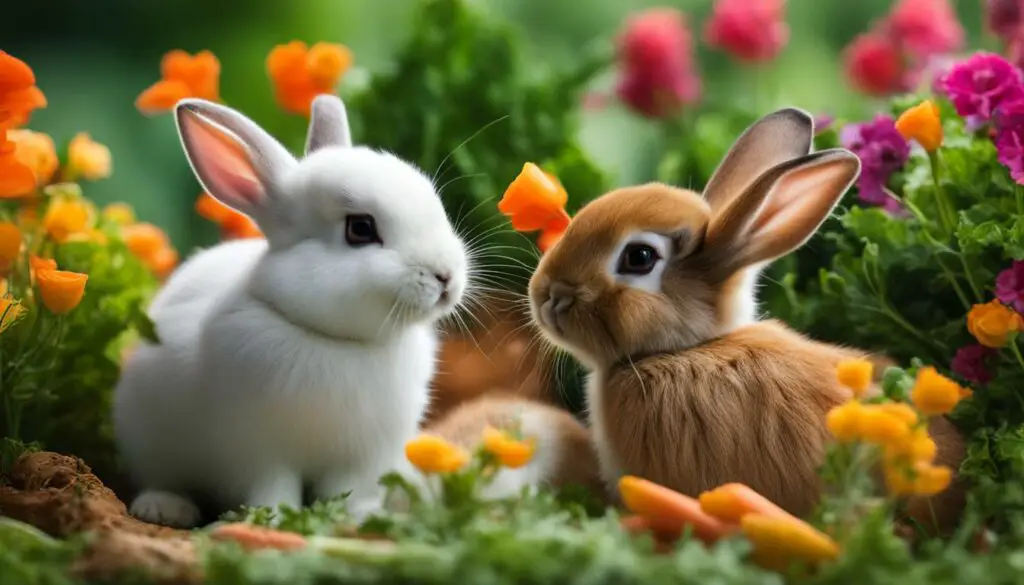
Key Takeaways
After learning about the essentials of caring for a baby rabbit, here are the key takeaways to keep in mind:
- Do not separate a baby rabbit from its mother before 8 weeks. This is crucial for their development and overall well-being.
- Provide a safe and spacious enclosure for your baby rabbit. A large dog crate or connected storage panels can be used.
- Offer a balanced diet consisting of hay, pellets, and fresh foods. Hay should be available 24/7, while pellets should be a high-quality blend without fillers.
- Regular grooming is important for your baby rabbit’s health. Brush their fur to remove loose fur and prevent blockages, and clip their nails every 1-2 months.
- Interact with your baby rabbit gently and provide them with stimulating toys for playtime. Supervised daily exercise outside of the cage is also beneficial.
- Spaying and neutering your baby rabbit is essential to reduce hormonal behaviors and prevent unwanted pregnancies.
- Keep a close eye on your baby rabbit’s health and behavior. If you notice any symptoms of illness, seek veterinary care promptly.
By following these tips and guidelines, you can ensure that your baby rabbit grows into a healthy and happy adult rabbit. Remember, each rabbit is unique, so always observe their individual needs and make adjustments as necessary.
Additional Resources
For more detailed information and resources on caring for your baby rabbit, check out the following sources:
- [First source]
- [Second source]
- [Third source]
These resources can provide further insights and guidance to support you in your journey as a baby rabbit parent.
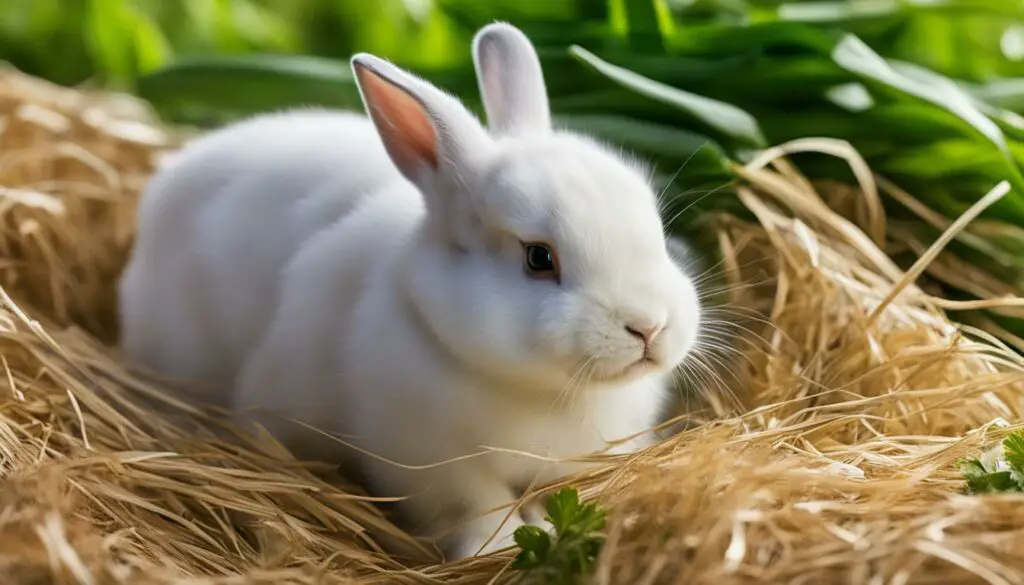
Conclusion
In conclusion, caring for a baby rabbit requires special attention to their unique needs in order to ensure their health and well-being. By following the guidelines outlined in this care guide, you can provide your adorable baby rabbit with the care and love they need to grow into a happy and healthy adult rabbit. Remember to consult with a veterinarian for any concerns or questions you may have about your baby rabbit’s health.
By preparing a suitable living space, providing a balanced diet, grooming regularly, and creating opportunities for interaction and exercise, you can create a nurturing environment for your baby rabbit to thrive. Taking preventive measures, such as spaying and neutering, and monitoring their health closely, will help ensure a long and happy life for your furry friend.
Remember that each baby rabbit is unique and may have specific needs or preferences. It’s important to observe and understand your baby rabbit’s behavior and adjust their care accordingly. With love, patience, and proper care, your baby rabbit will bring joy and companionship to your life for years to come.
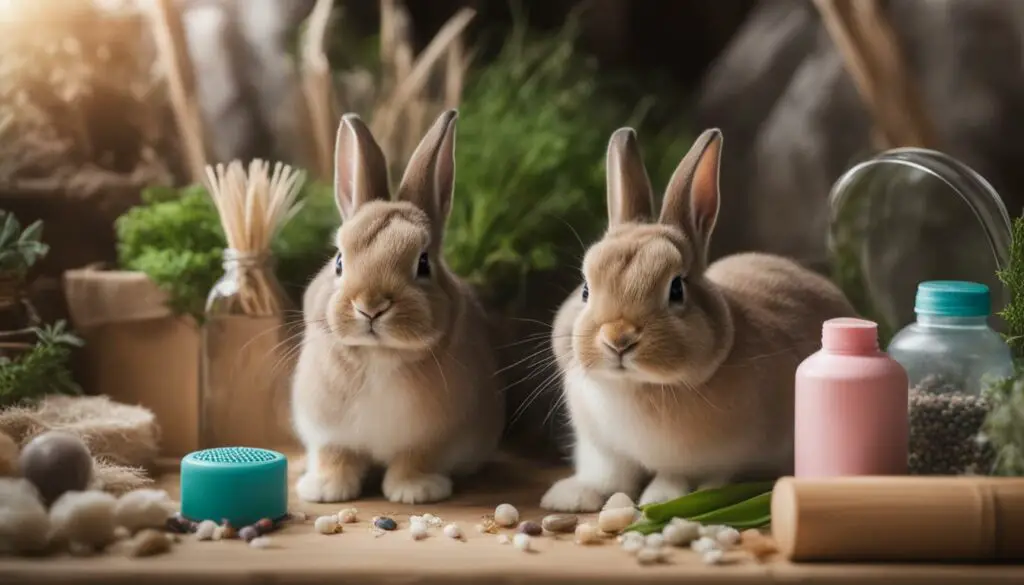
Thank you for reading this essential care guide for baby rabbits. We hope that you find it helpful and informative as you embark on this wonderful journey of caring for your little furry friend. If you have any further questions or need additional resources, please refer to the provided list or consult with a knowledgeable veterinarian.
Additional Resources
If you’re looking for more information and resources on caring for your adorable baby rabbit, you’ve come to the right place! Here are some valuable sources that can provide you with the guidance and knowledge you need:
1. [First Source]: Explore this comprehensive website for a wide range of articles and tips on baby rabbit care. From nutrition and grooming to behavior and health, you’ll find expert advice to help you navigate every aspect of raising a baby rabbit.
2. [Second Source]: This trusted online community forum is a hub for rabbit lovers and experienced caregivers. Join the discussions, ask questions, and gain insights from rabbit enthusiasts who have firsthand experience raising baby bunnies.
3. [Third Source]: Dive into this informative book that covers everything you need to know about caring for baby rabbits. From understanding their developmental stages to creating a nurturing environment, this resource is a must-have for any new rabbit parent.
By exploring these resources, you’ll be armed with the knowledge and support to provide the best care for your baby rabbit. Remember, every bunny is unique, so it’s important to stay curious, be observant, and adapt your approach to their individual needs. Happy rabbit parenting!
FAQ
Can I bathe my baby rabbit?
No, baby rabbits do not need baths as it can strip their fur of natural oils. Regular brushing is important for their grooming needs.
How often should I clip my baby rabbit’s nails?
It’s recommended to clip your baby rabbit’s nails every 1-2 months to prevent them from becoming overgrown. Be careful not to cut the quick.
When can I introduce fresh foods to my baby rabbit’s diet?
Fresh foods can be introduced when your rabbit is at least 3 months old. Prior to that, a diet of hay and pellets should be the main focus.
How should I interact with my baby rabbit?
Start with gentle interactions and let your baby rabbit come to you at their own pace. Provide them with toys that stimulate their curiosity and supervise daily exercise outside of the cage.
Why is spaying or neutering my baby rabbit important?
Spaying or neutering your baby rabbit helps reduce hormonal behaviors and prevents unwanted pregnancies. It’s best to have this procedure done by an exotic vet.
What should I do if I come across a nest of wild baby rabbits?
It’s best to leave them alone unless they’re in immediate danger. The mother will nurse them for a few minutes a day and will return for her babies.
What should I do if the mother rabbit isn’t feeding her babies?
If the mother isn’t providing adequate care, you may need to step in and hand-feed the baby rabbits using a formula made with goat’s milk, kitten milk replacer, colostrum, and heavy cream.
How often should I weigh the baby rabbits to ensure they are gaining weight?
Weigh the baby rabbits daily to monitor their weight gain and ensure they are growing properly.
Do I need to separate the father rabbit from the babies?
Once the babies reach puberty, it’s best to separate the father rabbit as he may become aggressive. Neutering the father is recommended to prevent unwanted pregnancies.
What should I do if my baby rabbit’s mother is immature?
If the mother is not providing proper care, you may need to hand-feed the baby rabbits until she is able to take over. Consult with a vet for guidance.

